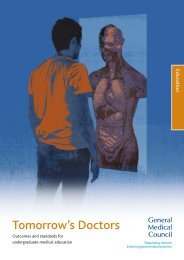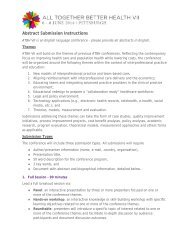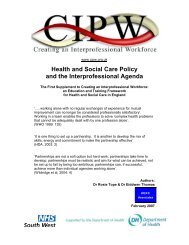Developing Interprofessional Education in health and social care ...
Developing Interprofessional Education in health and social care ...
Developing Interprofessional Education in health and social care ...
You also want an ePaper? Increase the reach of your titles
YUMPU automatically turns print PDFs into web optimized ePapers that Google loves.
ForewordsThis report is an important contribution on a vital topic. As the 21 st centuryprogresses it becomes ever clearer that substantial changes <strong>in</strong> the education <strong>and</strong>tra<strong>in</strong><strong>in</strong>g of professionals are required <strong>in</strong> order to meet the chang<strong>in</strong>g needs of theworld‟s population. We see this both at the global <strong>and</strong> at the national level.Powerful forces are br<strong>in</strong>g<strong>in</strong>g about change globally. We all recognise that political<strong>and</strong> economic power is shift<strong>in</strong>g eastwards <strong>and</strong> that there are ever <strong>in</strong>creas<strong>in</strong>gconnections <strong>and</strong> communications between the different countries <strong>and</strong> regions of theworld. We can also see that <strong>in</strong> terms of <strong>health</strong> we are becom<strong>in</strong>g more<strong>in</strong>terdependent. We are vulnerable to the same global p<strong>and</strong>emics which can spreadat the pace of air travel <strong>and</strong> to climate change <strong>and</strong> we depend on the same groupsof <strong>health</strong> workers, medic<strong>in</strong>es <strong>and</strong> knowledge base.As countries grow richer they start to respond to the dem<strong>and</strong>s of their people forbetter <strong>health</strong><strong>care</strong> <strong>and</strong> education. It is no surprise that India <strong>and</strong> Ch<strong>in</strong>a have both <strong>in</strong>recent years announced plans to develop national <strong>health</strong> systems that reach all theircitizens <strong>and</strong> that many countries <strong>in</strong> Africa are do<strong>in</strong>g the same. The Arab Spr<strong>in</strong>g hasalso led countries like Saudi Arabia to respond by improv<strong>in</strong>g <strong>health</strong><strong>care</strong> <strong>and</strong> therebyimprov<strong>in</strong>g stability <strong>and</strong> reduc<strong>in</strong>g the risk of rebellion <strong>in</strong> their territories. As thesecountries develop, however, they will not just copy western models of <strong>health</strong><strong>care</strong> butcreate their own based on their own experiences <strong>and</strong> the best of the westerntradition.In Europe <strong>and</strong> America we built our <strong>health</strong> systems <strong>in</strong> the 20 th Century to deal withthe needs of the time. We created strong professions <strong>and</strong> robust systems whichcentred on hospitals <strong>and</strong> specialist knowledge <strong>and</strong>, <strong>in</strong> effect, created a selfconta<strong>in</strong>ed <strong>in</strong>dustry which had few l<strong>in</strong>ks with other important determ<strong>in</strong>ants of <strong>health</strong>such as education, employment <strong>and</strong> the environment. The countries which are onlynow develop<strong>in</strong>g their <strong>health</strong> systems are better able to address the new needs ofthe 21st Century where non communicable diseases are fast becom<strong>in</strong>g a globalepidemic, where the behaviour of patients <strong>and</strong> the public are both part of theproblem <strong>and</strong> part of the solution <strong>and</strong> where science <strong>and</strong> technology are offer<strong>in</strong>g newsolutions. We can already see that many countries are creat<strong>in</strong>g systems which getrid of some of the barriers between <strong>health</strong> <strong>and</strong> other sectors, engage communities<strong>and</strong> tra<strong>in</strong> different groups of staff. We need, as I have argued elsewhere, to Turnthe World Upside Down <strong>and</strong> learn from them.Turn<strong>in</strong>g to the UK we now underst<strong>and</strong> that the greatest dem<strong>and</strong> placed on the NHScomes from people with long term conditions rather than acute ones. They needcont<strong>in</strong>u<strong>in</strong>g help to look after themselves, manage <strong>in</strong>termittent crises <strong>and</strong> ma<strong>in</strong>ta<strong>in</strong>their <strong>health</strong>. Despite many excellent examples to the contrary, the NHS is still aservice that is geared more towards one-off episodes of treatment. It needs tochange so as to adapt to the new reality <strong>and</strong>, most profoundly of all, we need tobeg<strong>in</strong> to treat the NHS as what it is – a part of the local <strong>in</strong>frastructure <strong>and</strong> servicesthat we all rely on. It should not be seen as a completely separate activity or <strong>in</strong>dustrybut part of the network of organisations <strong>and</strong> services locally that help elderly,disabled <strong>and</strong> sick people to get on with their lives, children to develop, our streets tobe safe <strong>and</strong> our environment <strong>and</strong> workplaces clean <strong>and</strong> <strong>health</strong>y.2













